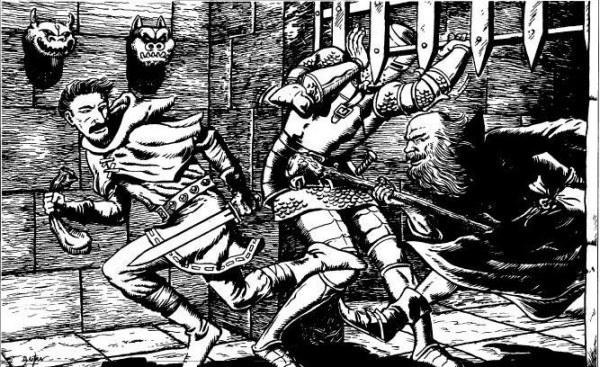
2022-12-18

A technical diagram by Terry Dykstra.
Today I'd like to talk about running away and how players decide whether to leave behind fallen party members to improve their own chances of survival.
A couple weeks ago, I started running our campaign on Fridays, adding a third day on top of the weekly Wednesday and Saturday sessions. The Friday game differs from the other two days in two ways. First, it's a closed table where all the players know each other well. Second, the PCs began their careers far to the east the existing PCs – something like 1000 miles or more.
With this new, semi-isolated group (one of the players plays on Wednesdays), a different play style can be expected. Even Wednesdays and Saturdays have a different vibe despite sharing some common players.
I expected this group to have some advantages and disadvantages compared to the other groups, both stemming from the players' previously-existing relationships. This is in contrast to the other two game nights which contain players who may have just met within the last few months. Two of the major advantages being easier communication and greater willingness to take a hit on one PC for the benefit of the others. For example, I expected players to be able to, say, give extra treasure to a PC to level them up for the benefit of the campaign. Naturally, this can't be as readily expected from players who just met.
I failed to foresee one severe disadvantage: these guys do not want to leave their friends behind. The death toll from just the first two sessions rivals the tombstone count of the rest of the campaign in totality. Players have been choosing to go down fighting in hopes of pulling out a win and saving their unconscious or otherwise disabled companions.
The thing with old-school D&D is: if you're in a fair fight, the situation is not good. It might not be bad, but it's certainly not good. And if you're considering whether to flee or fight to the death, the situation almost certainly is favoring the enemy, and that's very bad. Especially at low levels, you have got to get an advantage before or during combat – preferably before – or you're especially risking it all.
While repopulating their character stables, the Friday players reflected on what had happened. One wondered if he should just play evil characters from now on so he can leave his friends behind. This indicated to me a misunderstanding of what is expected in old-school D&D (and of the alignment system), which I hopefully cleared up.
Sometimes, you've got to sacrifice characters, especially in a low-level party. The odds are not good for total survival at that level. You may get lucky and wind up with 2nd and 3rd level characters without losing a PC, but the odds are low. When a new group is getting started, not only do they lack a higher-level PC to increase their survivability, they also lack magic items, and therefore lack "get out of jail" cards.
After the massacre of the first two sessions, I think this new Friday group has got a better idea of what to expect, and I think they will be more willing to flee in the future, even if it means losing a PC. Losing one or two PCs is always better than losing four.
In a TPK, two major things happen which make everything far worse than leaving friends behind:
I often talk about how AD&D is a campaign game, and that holds true here. It seems to me that success can be found in this game by aiming to advance the campaign, rather than thinking in terms of characters. That's not to say that characters are unimportant – of course we love our characters and want them to succeed. But this is a deadly game. When the blood pools on the wrong side of the battlefield and a decision is prompted, a sorrowful choice may be best for everyone involved.
Leaving your friends' PCs behind sucks. But it very well may be the best decision for those PCs' players, and for the campaign. True, there might be a chance to save everyone – but how do the odds weigh against the consequences of greater loss?